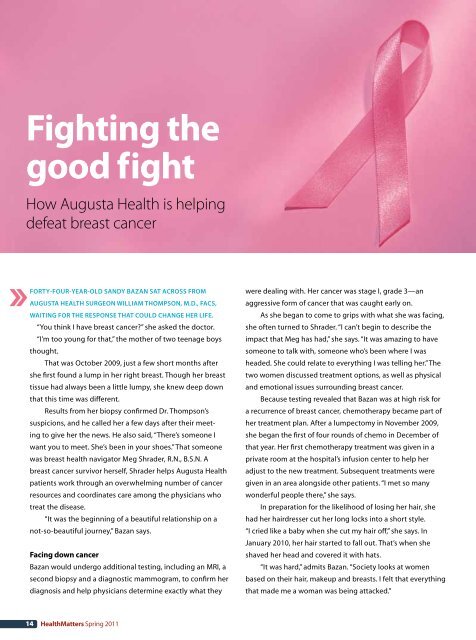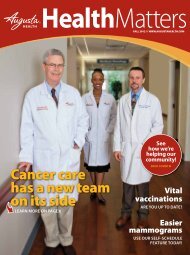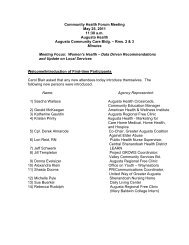You also want an ePaper? Increase the reach of your titles
YUMPU automatically turns print PDFs into web optimized ePapers that Google loves.
Fighting the<br />
good fight<br />
How <strong>Augusta</strong> <strong>Health</strong> is helping<br />
defeat breast cancer<br />
forty-four-year-old Sandy baZan Sat acroSS from<br />
auguSta health Surgeon william thompSon, m.d., facS,<br />
waiting for the reSponSe that could change her life.<br />
“You think I have breast cancer?” she asked the doctor.<br />
“I’m too young for that,” the mother of two teenage boys<br />
thought.<br />
That was October 2009, just a few short months after<br />
she fi rst found a lump in her right breast. Though her breast<br />
tissue had always been a little lumpy, she knew deep down<br />
that this time was diff erent.<br />
results from her biopsy confi rmed Dr. Thompson’s<br />
suspicions, and he called her a few days after their meeting<br />
to give her the news. He also said, “There’s someone I<br />
want you to meet. She’s been in your shoes.” That someone<br />
was breast health navigator Meg Shrader, r.n., B.S.n. A<br />
breast cancer survivor herself, Shrader helps <strong>Augusta</strong> <strong>Health</strong><br />
patients work through an overwhelming number of cancer<br />
resources and coordinates care among the physicians who<br />
treat the disease.<br />
“It was the beginning of a beautiful relationship on a<br />
not-so-beautiful journey,” Bazan says.<br />
Facing down cancer<br />
Bazan would undergo additional testing, including an MrI, a<br />
second biopsy and a diagnostic mammogram, to confi rm her<br />
diagnosis and help physicians determine exactly what they<br />
14 <strong>Health</strong>Matters Spring 2011<br />
were dealing with. Her cancer was stage I, grade 3—an<br />
aggressive form of cancer that was caught early on.<br />
As she began to come to grips with what she was facing,<br />
she often turned to Shrader. “I can’t begin to describe the<br />
impact that Meg has had,” she says. “It was amazing to have<br />
someone to talk with, someone who’s been where I was<br />
headed. She could relate to everything I was telling her.” The<br />
two women discussed treatment options, as well as physical<br />
and emotional issues surrounding breast cancer.<br />
Because testing revealed that Bazan was at high risk for<br />
a recurrence of breast cancer, chemotherapy became part of<br />
her treatment plan. After a lumpectomy in november 2009,<br />
she began the fi rst of four rounds of chemo in December of<br />
that year. Her fi rst chemotherapy treatment was given in a<br />
private room at the hospital’s infusion center to help her<br />
adjust to the new treatment. Subsequent treatments were<br />
given in an area alongside other patients. “I met so many<br />
wonderful people there,” she says.<br />
In preparation for the likelihood of losing her hair, she<br />
had her hairdresser cut her long locks into a short style.<br />
“I cried like a baby when she cut my hair off ,” she says. In<br />
January 2010, her hair started to fall out. That’s when she<br />
shaved her head and covered it with hats.<br />
“It was hard,” admits Bazan. “Society looks at women<br />
based on their hair, makeup and breasts. I felt that everything<br />
that made me a woman was being attacked.”





